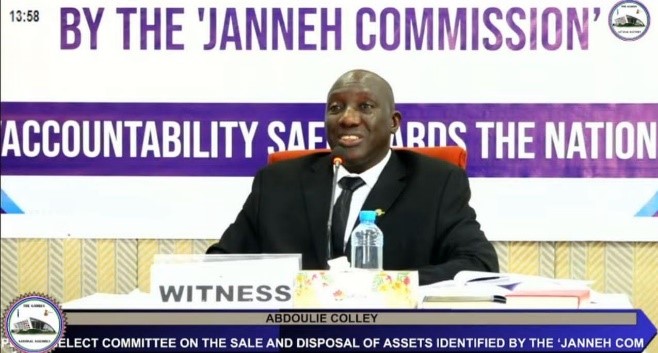By Kebba AF Touray
Lawmakers probing the sale of assets belonging to former President Yahya Jammeh questioned the Registrar General last week over the legal authority under which the government sold seized lands.
Appearing before the National Assembly’s Special Select Committee on Wednesday, July 23, 2025, Registrar General Abdoulie Colley was asked to explain which law grants the government the power to sell forfeited properties.
“So, my question is, in your view, where does the government derive the authority or power to sell land?” asked Committee Counsel Aji Sai Kah.
Colley responded: “Like I said, the government owns the land. We have one government. Maybe Ministry of Local Government and Lands. Maybe other Ministries like Ministry of Justice. The Solicitor General can act on behalf of government.”
Counsel Kah then asked: “In this case, what role would the Solicitor General and Ministry of Land play in the sale of land on behalf of the government?”
Colley replied: “Like I said. So the Solicitor General, acting on behalf of government, can do it. That’s why he’s Solicitor General and Legal Secretary.”
Citing the State Lands Act, Counsel Kah told him that land owned by the state is vested in the Minister of Local Government and Lands. She asked: “Therefore, how does the Solicitor General come in to sell land or even allocate land to any individual or company?”
Colley responded: “That’s why I said, the Minister of Land can lease, as the individual acting as the one administering the land.” He added, “But the Solicitor General too, by virtue of his position as Solicitor General and Legal Secretary, can act on behalf of government.”
Counsel asked, “Act on behalf of government to allocate land or sell land?”
Colley replied: “Solicitor General can act on behalf of the government to sell land.”
He continued, “In my view, land allocation is only done by the Ministry of Land and when it comes to sale, it is the Solicitor General. That’s my view.”
When asked how the Solicitor General goes about selling land, Colley said: “It’s just automatic, because by acting o pursuant to the order of the commission, the Solicitor General can just rest it in the new owner.”
Counsel Kah asked whether the Commission of Inquiry issued any order directing the Solicitor General to sell land.
Colley replied: “That is a recommendation that was accepted by government, by white paper, and acting upon that. If you look at the recital that I provided this morning, that’s the root of the history of the basis for the sale.”
“So, are you equating the recommendation of the Commission of Inquiry to an order of the Commission Inquiry?” she asked.
Colley answered: “The Commission of Inquiry provided recommendation, and if it is accepted by the government and the White Paper is issued, and that was basis and not only the recommendations from the Commission.”
Counsel Kah asked: “Are you saying government accepting recommendations of the Commission as a result of an order?”
Colley responded: “Yes, especially if you don’t appeal. If you don’t appeal before the Court of Appeal, government can act on it.”
Counsel clarified: “Is that the effect? That is not… I am not talking about appeals.”
She repeated: “Are you equating a recommendation of the Commission of Inquiry with an order?”
Colley answered: “No,” and added: “Only a recommendation is not sufficient, you still have to go to government, I mean Cabinet. If it is accepted, then the white paper is published. Because government is not bound to accept all the recommendations.”
He stated that the recommendations accepted and gazetted allow the Solicitor General to act pursuant to that white paper and alienate the properties.
Counsel then asked him to provide any law or authority stating that the Solicitor General can sell land on behalf of the government.
Colley said: “I can make the law available or give an opinion, and I need time to provide an opinion. I am not here to provide an opinion, legal opinion, but that is my view.”
Counsel responded: “It is not a question of opinion,” and asked him whether he could show where in the laws of the government it states that the Solicitor General can sell land on behalf of the state.
Colley said: “What I can provide is the mandate of the Solicitor General acting on behalf of the government of the government to do any action.”
Counsel Kah asked if his department was assigned to do any work on the assets after the life of the Commission.
Colley said: “Yes,” and added that he received a memo from the Department of Civil Litigation to cancel certain properties. “It was an internal memo,” he said.
When asked who wrote the memo, Colley said: “As far as I can recall, it was written by Mr. Kimbeng Tah. He was the Deputy Director [of Civil Litigation], and it was addressed to the Registrar General and was copied to the Solicitor General.”
Asked whether he had a copy of the memo, Colley said he had searched but could not find it. “I’ll keep looking,” he told the Committee.
Counsel Kah instructed him to continue searching for the document, stating that it is of great significance to the Committee.






















